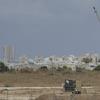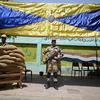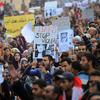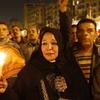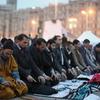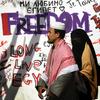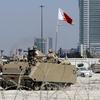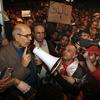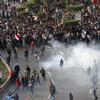Shadi Hamid
Director of research, Brookings Doha Center. Fellow Saban Center for Middle East Policy at Brookings
Shadi Hamid appears in the following:
For American Muslims, 9/11 Shaped Careers, Politics, and Identity
Tuesday, September 11, 2018
The Rise of ISIS Amid A Year Of Foreign Policy Challenges
Wednesday, December 31, 2014
Egypt Steps Up in Israeli-Palestinian Conflict, But to No Avail
Tuesday, July 15, 2014
Egyptian Democracy Put to the Test
Wednesday, June 04, 2014
Both the coup that overthrew Egyptian president Mohamed Morsi and this month's election that put military leader al-Sisi in power reflect a democracy that doesn't quite line up with western expectations.
Egypt: Is This a Coup or a Popular Revolution?
Friday, July 05, 2013
Military Coup Staged in Egypt, Morsi Ousted as President
Wednesday, July 03, 2013
Examining the Situation in Egypt
Wednesday, July 03, 2013
With 70,000 Syrians Dead, Why are Chemical Weapons the Game Changer?
Wednesday, May 01, 2013
Reassessing Military Aid to Egypt
Thursday, June 21, 2012
Should the US Intervene in Syria?
Tuesday, January 31, 2012
On Monday Arab League representatives met with the United Nations Security Council to discuss a plan of action for Syria. More than 5,000 Syrians have been killed by government forces since protests against President Bashar Al-Assad began last March. Secretary of state Hillary Clinton delivered a strong message of support to the Syrian resistance the same day: "The longer the Assad regime continues its attacks on the Syrian people and stands in the way of a peaceful transition, the greater the concern that instability will escalate and spill over throughout the region."
How Will Bin Laden's Death Affect Mid East Uprisings?
Tuesday, May 03, 2011
Since the start of the political uprisings in the Middle East, regimes have fallen in Egypt and Tunisia. Meanwhile, Yemen, Syria, Bahrain and Libya continue their struggles to unseat dictators and bring about democratic change. And throughout it all, the voice of al-Qaida — and more importantly, its leader, Osama bin Laden — has been relatively silent. The question now remains, will the death of bin Laden at the hands of American forces continue to spur democratic movements or could it fuel terrorist organizations to stand in the way of change in the Middle East?
Revolution Blowback: More Tumult in Middle East
Thursday, March 17, 2011
It’s been an eventful week in the Middle East, but much of the news has been overshadowed by the unfolding disaster in Japan. Saudi military forces have crossed into Bahrain as protester violence continues; the situation in Libya is escalating; and in Egypt, a referendum on the constitution scheduled for Saturday is the cause of raging debate. Amidst all this change in the Middle East, is the United States taking a strong enough position for democracy?
Competing Factions Vie for Power in Egypt
Monday, January 31, 2011
On Friday, President Hosni Mubarak appointed Omar Suleiman as the country's new vice president. And Nobel Laureate Mohamed ElBaradei returned to his native country and is adopting a leadership role. One of Egypt's most powerful opposition groups, the Muslim Brotherhood, has increased its presence on the streets of Cairo.As Egypt’s central power wobbles, the global conversation has turned to the big question: who will step in if Mubarak leaves?
Egypt 101: Questions, Answers, Guides
Monday, January 31, 2011
Egypt 101: Your Questions Answered
Monday, January 31, 2011
What are your questions about the situation in Egypt? Shadi Hamid, director of research at the Brookings Doha Center and fellow at the Saban Center for middle East Policy, has answers.
Submit your question about the situation in Egypt at It's A Free Country.
Who is the Muslim Brotherhood?
Monday, January 31, 2011
Shadi Hamid, Director of Research at the Brookings Doha Center, and fellow at the Saban Center for Middle East Policy at the Brookings Institution discusses the various political forces at work in Egypt, and whether the opposition forces span beyond Egypts border.
Egypt Takes Stock After Major Protests
Wednesday, January 26, 2011
Protests erupted in the streets of Cairo and other major Egyptian cities yesterday, calling for the ousting of the 30-year rule of President Hosni Mubarak. Protesters are hoping to share the same success protestors in Tunisia saw in recent weeks, but that may prove to be more difficult dealing with the Egyptian government and military which are much larger and stronger. Emad Shahin, Henry R. Luce associate professor of religion, conflict and peace building at the University of Notre Dame, analyzes these protests and the Egyptian government.


